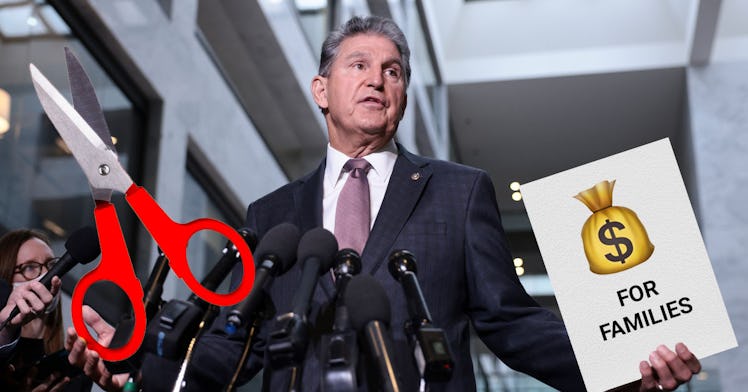If You Make More Than $60k, This Senator Thinks You Don’t Deserve a Child Tax Credit
Barely-middle class parents would be hit hard by the "reforms" Manchin is insisting on.

Democratic Senator Joe Manchin of West Virginia has a problem with the improved child tax credit included in the American Rescue Plan, Joe Biden’s signature COVID-19 relief law that delivers cash payments to parents monthly and has lifted millions of children out of poverty. Specifically, he wants a future version of the credit that will, due to more stringent means-testing, help fewer people.
Here’s what you need to know about the stance Manchin is taking, how families would suffer if he is successful, and what might actually happen to President Build Back Better agenda going forward.
Why is the child tax credit the subject of negotiations?
The expanded child tax credit was passed with Joe Manchin’s support as part of the American Rescue Plan in March, but it’s currently slated to last only until the end of this year. The president can only extend the program if Congress sends him a budget that does so, which it has so far failed to do largely thanks to internal Democratic opposition from Manchin and Sen. Kyrsten Sinema of Arizona, the same duo who killed what would’ve been the first federal minimum wage hike in more than a decade from its current $7.25 an hour to $15 an hour by 2025. (A study has linked higher minimum wages to lower rates of infant mortality in major cities.)
What does Manchin want to change about the child tax credit?
Manchin wants to add a work requirement and dramatically lower the income limit so that the credit only goes to families making less than $60,000, two priorities that are in conflict with each other.
A work requirement would mean that if a parent (or parents) loses their job(s), they would not receive the child tax credit. And since half of it can be paid out in the form of monthly payments, it would provide a modicum of ongoing support during a financially stressful time. It’s obvious that parents who are out of work will be among those most in need of assistance to ensure their kids have a place to live and food to eat. Adding a work requirement would cruelly take away an ongoing source of assistance at the very moments parents need it the most.
The contradiction in Manchin’s position is due to his insistence that he’s trying to ensure that only the families most in need of government aid receive it. That’s why he wants to drop the income limit to $60,000.
Currently, single filers making up to $75,000, heads of household making up to $112,500, and joint filers making up to $150,000 receive the full credit, with smaller credits going to joint filers with income up to $400,o00 and individual filers making up to $200,000.
On the one hand, Manchin wants to lower the income threshold to limit the credit the the lowest-income families. On the other, he wants to deny the credit to those families who are in the lowest income group because of unemployment, something that is often out of their control, an especially true reality given how the early pandemic days forced millions of low-wage workers out of their jobs as businesses shut down.
What does the public want?
A poll conducted for think tank Family Story showed that support for extending the tax credit is strong, with 70 percent of the public, 80 percent of parents, and 84 percent of mothers with children under five in favor. That strong support endured despite the polling firm presented respondents with the argument that the child tax credit is too expensive for the United States, a big part of the argument Manchin has been making to cut the price of the budget reconciliation bill from $3.5 trillion to $1.5 trillion even after progressives compromised from their initial $6 trillion proposal.
In West Virginia, the state Manchin represents, 301,000 children are benefitting from the more than $77 million in child tax credit money that has gone to parents and guardians. Public support is also high. Data shows that food insecurity is lower since the advance child tax credit payments started to go out, and that people are spending most of the money on essentials like food, utilities, and clothing.
Furthermore, an astonishing 93 percent of West Virginia children would benefit from the expanded child tax credit in the Build Back Better plan according to Accountable.US.
What happens next?
Under the reconciliation process, the Senate can pass legislation with a simple majority. Currently, there’s a 50-50 split in the Senate, so the party can’t afford to lose a single vote given the certainty that the GOP will vote as a bloc against the bill.
That means that any individual senator can derail their party’s legislative process, which is exactly what Manchin is threatening to do. It’s not a good situation if your goal is to pass legislation that’s unusually ambitious.
Of course, while Manchin has always a solidly conservative Democrat, he is still a Democrat. That means that he’s likely more interested in passing a watered-down, less effective version of the Build Back Better agenda than passing no bill at all. The rest of the Democratic caucus in the Senate will then be faced with a similar choice: accept Manchin’s cuts or oppose the legislation, risking passing nothing and the new child tax credit expiring at the end of the year and midterms that will likely give Republicans control of Congress looming in 2022.
All of this is to say that we don’t know what will happen even though it’s clear that the new child tax credit is one of the few federal initiatives that materially improved the lives of working and middle-class parents and children. The bottom line is that, if Manchin has his way, millions of kids, including thousands in West Virginia, are likely to slip back into poverty.